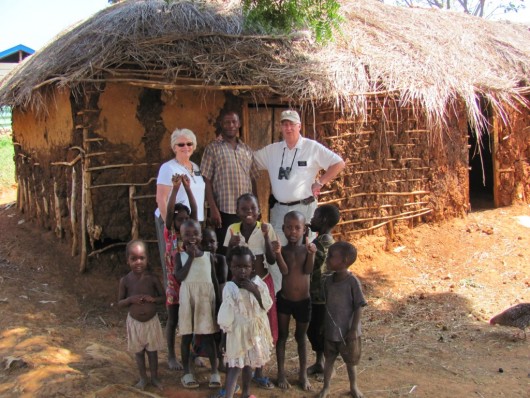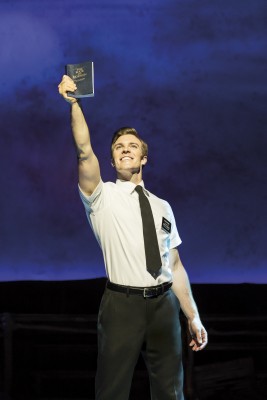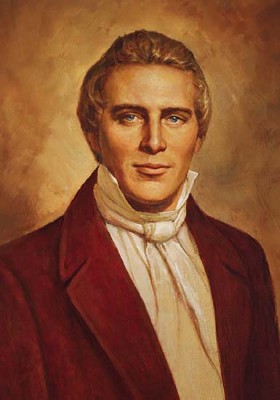Ask a Mormon about The Book of Mormon
Posted on March 19, 2015 By Mike Ross culture, Entertainment, Faith, Front Slider, Music, Theatre
 Ask a Mormon about The Book of Mormon and you’ll discover they’re not exactly falling all over themselves to see the satirical musical by the creators of South Park (update: returning to the Jubilee Auditorium Sept. 13-18)
Ask a Mormon about The Book of Mormon and you’ll discover they’re not exactly falling all over themselves to see the satirical musical by the creators of South Park (update: returning to the Jubilee Auditorium Sept. 13-18)
They say it makes a mockery of their religion. They say it’s disrespectful. They say it misses the point.
Kim Shipley, a retired lawyer from Barrhead, Alberta, and member in good standing of the Church of Jesus Christ of Latter-day Saints (LDS), hasn’t seen The Book of Mormon and doesn’t intend to. “It’s not always a good idea to form opinions about something you haven’t examined,” he says, “but it seems to be making fun of a lot of the things we hold sacred.”
Missionary work is one of them. Shipley and his wife Rae Ann have done missions around the world, most recently as senior missionaries in 2010 in Uganda, cooking, doing laundry and taking care of the young Mormons who as per optional custom devoted two years of their lives to spreading the gospel to Ugandans – just like the main characters in The Book of Mormon.
 In the fictional hit musical, Elder Price and Elder Cunningham are sent to a remote village in Uganda, where they are immediately robbed at gunpoint, assailed by a vicious warlord named General Butt-F—ing Naked (based on the real-life Liberian lunatic named General Butt Naked), and meet locals far more concerned with civil war, starvation and AIDS than hearing some nutty tale of Jesus in America from a couple of naïve white goofballs from Salt Lake City. Cue the jaunty song and dance numbers Hello! and All American Prophet, then a musical response from troubled Africans called Hasa Diga Eebowai! – which translates roughly to F— you, God!
In the fictional hit musical, Elder Price and Elder Cunningham are sent to a remote village in Uganda, where they are immediately robbed at gunpoint, assailed by a vicious warlord named General Butt-F—ing Naked (based on the real-life Liberian lunatic named General Butt Naked), and meet locals far more concerned with civil war, starvation and AIDS than hearing some nutty tale of Jesus in America from a couple of naïve white goofballs from Salt Lake City. Cue the jaunty song and dance numbers Hello! and All American Prophet, then a musical response from troubled Africans called Hasa Diga Eebowai! – which translates roughly to F— you, God!
In real life, Shipley says, the North American missionaries were paired with their African counterparts – yes, there are Mormons in Uganda – and stayed with local families. As in the play, they walked long distances door to door to proselytize, to spread the Word, to ask of complete strangers the hard question, “What is the purpose of life?” This was a physically demanding task in rural Africa, Shipley says, in this case the fishing village of Jinja, East of the capital Kampala; there are no streetlights at night and the potholes would put Edmonton’s to shame. The missionaries were sometimes confined to their quarters due to rioting or a large army presence. Armed security guards were everywhere, Shipley says – the No. 1 occupation. The missionary work went on, however, and “the Ugandan people by and large like to talk about Jesus Christ.”
Aside from winning converts, much of the missionaries’ time was spent in humanitarian activities: helping with food and water gathering, caring for AIDS victims and building huts.
Elder Shipley’s first mission was in 1966: in Hong Kong at the height of the Cultural Revolution. Even in the relative safety of the former British colony, there were riots, they would smell tear gas coming in the vents where they were staying. Shipley recalls the standard response to the purpose of life question: “Chī yǐnliào shuìmián, which means eat, drink and sleep, and make money,” he says. “That was their focus. You can imagine what they had been through in China, with the wars and the Cultural Revolution and the poverty. People were worried about their next meal. And when we got to Uganda it was the same thing. They’re worried about where their next meal is coming from. That’s just a fact of life in some places. It’s a matter of daily existence. How are you going to survive?”
 In fiction, in The Book of Mormon, Elder Price and Elder Cunningham are troubled by the same issues, by the apparent futility of their mission. Cunningham – a slacker who has not actually read the religious texts he was supposed to have been teaching – manages to convert the entire village with a story he just makes up. Cue Making Things Up Again, featuring a cameo from the Mormon prophet Joseph Smith himself.
In fiction, in The Book of Mormon, Elder Price and Elder Cunningham are troubled by the same issues, by the apparent futility of their mission. Cunningham – a slacker who has not actually read the religious texts he was supposed to have been teaching – manages to convert the entire village with a story he just makes up. Cue Making Things Up Again, featuring a cameo from the Mormon prophet Joseph Smith himself.
In real life, LDS membership is growing, according to some sources (like the LDS itself) thanks to its dedicated pitchmen. There didn’t used to be Mormons in Uganda. Shipley says that despite the troubles of people in a troubled country, it’s still worth it to proselytize, to try in their own way to make the world a better place.
The mission’s biggest effect is on the missionaries.
Shipley defends them passionately: “These missionaries have left their lives behind. They’ve gone out there at their own expense or their parents’ expense, given up their friends and what they liked to do, their schooling, and they’re over there experiencing a life of service. They’re over there experiencing a different culture, living with people with problems they wouldn’t have even guessed existed. It opens up a dimension of life that I think other young people don’t have.
“They make this incredible sacrifice and their lives are enriched by it, their lives are blessed by it. They’ll never be the same again. They’re going to come back and they’re going to have a new perspective on life. Even now, every time I look up and see the blue sky I kind of pinch myself and say, we are so lucky, in this country I am so blessed. It’s hard to have depression and social problems and unhappiness when all it takes is to see the blue sky to make you happy.”
Explaining the important difference between being naïve (fictional Mormons) and being innocent and pure (real-life Mormons), Shipley says that it’s easy for those South Park guys “to poke fun at people who take some of these old-fashioned values seriously, but these missionaries have walked the walk. They’ve done it. They’ve been there. They’re not poking fun at anybody, they’re not putting anybody down. They’re there to help. They’re there to build and to bless – and that’s an enriching and ennobling experience.”

Elder and Sister Shipley
So what can The Book of Mormon teach us about The Book of Mormon? Fans of South Park should be familiar with Trey Parker and Matt Stone’s attitude toward LDS. Above all other religions they’ve lampooned, they obviously have a special place in their hearts for the Mormons. Why else would they produce a whole musical about them? One South Park episode was devoted entirely to ridiculing Joseph Smith, whose story is no more outrageous than any other religion. And in another show depicting a battle between Satan and Jesus, virtuous people of all faiths wind up in hell, including the Pope, asking themselves, “Wait. If we’re all in hell, who’s in heaven?” Cut to heaven: populated only by clean-cut people in their white shirts, black ties and little nametags.
“The answer is … the Mormons,” says God.
A few years before braving Uganda, Elder and Sister Shipley went on a humanitarian mission to Bejing, China, where they would’ve been arrested for proselytizing. Back in 1966 (it was legal in Hong Hong at the time), in response to trying to convert Chinese people who may have had bigger problems, some of Shipley’s companions were chased by an angry mob; they escaped by ducking into a newspaper office, which put them on the front page the next day. But at no point did Shipley ever feel he ever feel like he was in danger.
He explains, “I guess when you’re young you think that you’re immortal.”
Well, that’s the whole idea, isn’t it?











